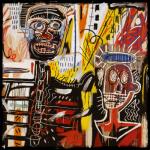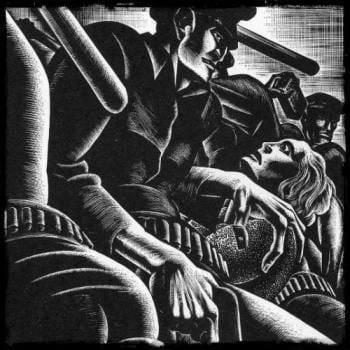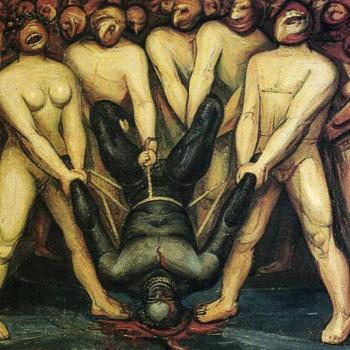- Natural law philosophy assumes intrinsic rational capacities of humans to properly perceive and pursue uniquely human goods.
- For centuries, natural law assumptions of intrinsic human rational capacities have been theologically agnostic. No Creator God required. Thoroughly optional!
- Beneath these open skies, natural law philosophy ranged broadly and proactively across the spectrum of evolving human circumstances and needs, to encompass international law, revolution and self-determination, social justice, and human rights.
- Since 1965, conservative natural law philosophers have systematically reverted to traditional Catholic, revealed religion, and God-dependent obsessions with sexual deviance and social disorder.
- The “New” Natural Law is actually “old” and “unnatural,” backward-looking, dogmatic, reactionary, and – by virtue of its sins of omission – extremely punitive.
Catholic natural law precepts infused the 1948 UN Universal Declaration of Human Rights, the adoption of which represented in some sense an arrival of a Catholic moral perspective positioned to sweep away the more retrograde baggage of the Church associated in prior decades with the inversions of fascist and Nazi regimes across Europe. However, Catholic natural law moral philosophy swung hard right in the 1960s. This “New Natural Law” expressed a cramped and twisted conception of human universality that began and ended with sexual morality. With the traditionalist Catholic right having in recent years penetrated many of the nation’s most significant media, political, legal, and educational institutions, what may seem like merely a crank political and moral philosophy has had enormous consequences for millions of people around the world.
What is “New” About the New Natural Law
The “New” Natural Law (NNL) that emerged from the religious and political turmoil of the 1960s – let’s call it the decade spanning Vatican II (1962-1965), Pope Paul VI’s papal encyclicals Dignitatis Humanae (1965) and Humanae Vitae(1968), and the U.S. Supreme Court’s Roe v. Wade decision (1973) – hardly resembled the less systematic and more discursive applications of Thomist natural law in prior centuries.
For nearly a millennium, natural law philosophy pursued positive, optimistic, forward-looking agendas that engaged and embraced the reality of social change. Natural law thinking had previously supported fresh perspectives about international law and the law of the sea (Hugo Grotius), the right to revolution and to national self-determination (John Locke), abolition of slavery (Frederick Douglass), Christian-Catholic notions of sin (Gilbert Chesterton), social justice (Antonio Rosmini), universal human rights (Jacques Maritain), and civil rights (Martin Luther King, Jr.).
By contrast, NNL returned to traditional Catholic obsessions with sexual deviance, family collapse, and social disorder. In this period, natural law philosophy shifted from a flexible and proactive set of ideas for adapting to evolving human circumstances into a rigid, reactionary, punitive, self-righteous, and disingenuous propaganda platform for the most conservative elements of the Catholic church and its intellectual apologists.
Austrian Economics Samples the New Natural Law: The Reviews are not Positive
Given their atheistic leanings, the lovable anarcho-capitalist avatars of Austrian economics at the Mises Institute in Alabama have evinced a surprising affinity for natural law. Their affection for its most optimistic precepts illustrates the combinatorial power of natural law philosophy as an open-ended meditation on the “natures” of things. In 1986, libertarian genius-nutjob Murray Rothbard published The Ethics of Liberty, a systematic effort to ground his concept of human liberty in the essential nature (hence eternal and outside of history) of humans themselves.
In The Ethics of Liberty, Rothbard threads the needle between the 4th-century theology of Augustine and the 20th-century mechanics of science to align himself with the 13th century Thomist natural law tradition. Rothbard believed this centuries-old tradition had carved a philosophical space independent from both theology and mechanics that could on its own terms, without reference to either a transcendent Creator or an immanent Creation, discern a system of laws derived from the natural order.
And so Mises Society reviewer David Gordon reported the sympathy with which he encountered Robby George’s tome, In Defense of Natural Law, which Oxford University Press published in 1999.
Would it not be excellent to have a sophisticated defense of this moral theory? Further, the author, a professor of politics at Princeton, combines two qualities rarely yoked together. He has an extensive and sophisticated grasp of the literature of analytic moral philosophy. Nevertheless, he rejects contemporary liberalism’s usual defenses. Who could ask for more?
Unfortunately, it seems, David Gordon could ask for more.
Dr. George is not the philosopher for whom we have all sought anxiously. His political philosophy is resolutely statist, and his version of natural law is not the genuine article. Rather, it is a bizarre concoction brewed by Germain Grisez, John Finnis, and their many collaborators. In fairness to them, they think their position faithfully expounds and develops Aquinas. I hope their historical contention fails, as it would be a shame to think a great philosopher capable of such nonsense.
“Bizarre concoction” indeed. One need not accept the more lunatic or contradictory aspects of Austrian economics to appreciate this disturbing weirdness of NNL, a dubious set of propositions that, as we shall see, more properly deserve to be labeled the “Old Unnatural Law.”
Blame it on the Sixties
In it what might be remembered as one of the less defensible readings of recent history, 92-year old Joseph Ratzinger (the conservative Catholic prelate also known as Pope Emeritus Benedict XVI) has blamed the moral disconnection and sexual depravity of the 1960s for the priestly scourge of child sexual abuse ravaging the Catholic Church since at least the 1950s. Most people would probably respond that the flexible sexual sensibilities of the 1960s are irrelevant to decades of child sexual abuse in the Catholic Church, because the Catholic Church itself is a sexually self-consuming ouroboros.
The retired Pope may have a point in one sense, however, if priestly pedophilia somehow represented compensation for the emerging liturgical deficits of the Catholic Church in the 1960s. This perspective would certainly comport with traditionalist arguments for a return to the thick mesmeric layers of liturgy capable of weaving their own contraceptive sheath around the clergy.
So too with the New Natural Law of moral philosopher Germain Grisez, which represented a sexually charged philosophical expostulation against the abradement of received tradition that shadowed Vatican II. A devout Catholic and professor of moral philosophy at Georgetown University, Grisez used this Catholic moment of institutional doubt to ponder the consequences of what he took to be ethical imperfections of Aquinas’s moral philosophy, resulting from the instrumental application of this moral philosophy to serve the ends of Aquinas’s true concern, which was systematic theology.
Whether this equivocation about Aquinas’s philosophical rigor is actually valid remains unimportant. For Grisez had also scanned the moral philosophies (truly, the guides for living) of those succeeding Aquinas in the centuries that followed and found them to be “a lot less impressive and a lot less philosophically viable than what you’ve got in Aquinas.” In the 1960s, Grisez himself – sensing opportunity in the rancorous debate about contraception within the Church – stepped in to fill this cavernous ethical breach, with a prodigious output of scholarship culminating some 30 years later in his The Way of the Lord Jesus, a compendium of pastoral guidance on all questions that touch upon the religious faith and obedience of Catholics (including weirdly specific and technically explicit sexual instructions for believers).
Ordered Love and Disordered Hate
For the origin story, let’s listen to Russell Shaw, Germain Grisez’s Boswell, whose essay based on conversations with Grisez was included by Robby George as the afterword of an edited volume about Grisez published by Georgetown University Press in 1998. We can start with a useful tell: “when the time came [for Germain] to go to school, the hurly-burly of classroom and playground struck him at first as an unpleasant change from the well-ordered atmosphere at home.” The psychic comforts of well-ordered environments pervade NNL, with the preeminent good the order that finds everyone and everything occupying their proper place within the great chain of being.
To honor the primacy of order, let’s call NNL, as first formulated by Grisez, a moral philosophy based on the vision of an “ordered love” governing the thoughts and deeds of humans. For Grisez, “Morality lay in the relationship between choice and action and the good of the human person: to be ‘for’ the different aspects of the well-being and full-being of persons was to be ‘loving;’ to be ‘against’ these human goods was to be ‘unloving.’”
Within the framework of NNL, the highest and most unassailable good is human procreation. For Grisez, then, “the choices to contracept” (and “to abort”) are disordered forms of hatred that violate “the human good of procreation and as such can never be justified.” In this foundation precept of the New Natural Law, Grisez anticipated and influenced Pope Paul’s Humanae Vitae, issued in 1968, which unconditionally condemned any use of contraception by Catholics (including those swallowing the bitter Pill).
In almost symmetrical counterpoint to the loosening of sexual morality in the 1960s, Grisez tightened the screws. Despite an ostensibly broad focus on the shared goods all humans might rightly seek, Grisez actually shrank and concentrated the scope of natural law moral philosophy to a sexual catechism serving this highest human good: species procreation. We can appreciate the population debates of the 1960s as context for the sexual liturgy Grisez unsparingly outlines for his readers. However, the implications of this focus extend far beyond the population conversation (although it remains relevant) to encompass wholesale philosophical and political mischief resulting from every other human good the New Natural Law has ignored and abandoned as irrelevant or counterproductive to its mission.
Upon this foundation of reaction to the promiscuity of the times, Grisez subsequently inspired and guided a significant community of like-minded philosophers (including Joseph Boyle, John Finnis, David Novak, Olaf Tollefsen, Christopher Tollefsen, Hadley Arkes, Robert P. George, and Neil Gorsuch) who in the past 50 years have dutifully served as his prophets, laboring to explain, improve, and proselytize tenets of the New Natural Law, fortifying it as a dam against surging global tides of immorality and debauchery.
Woe is Me
In a way, it makes sense that traditionalist Catholics bake despair into their conversations. After all, if the starting point for your worldview is that our earthly dispensation is a veil of tears; and you proceed from there to the actual history of slaughter, barbarity, and other random acts of mayhem that afflict our species (illustrating all too poignantly the point about the veil and the tears); and then you consider the inadequacy of our institutions, secular and sacred, to manage this flux (this flux without and this flux within); and then you consider how the world is filled with evildoers who relish and encourage the deviance and the disorder; and then you wonder, why the fuck is Jesus taking so long; well then, of course you’ve not got much choice but to routinely heave your guts into the dark and burly storm-wracked seas across which we blindly wander.
But still … it is striking the degree to which a convulsive capacity for self-pity and resentment has served as the condition for the enormous output of NNL philosophizing in the past 50 years. We witness this bitter brew when Germain Grisez tells Russell Shaw about the pervasive and unremitting hostility he faced from the academic establishment, dating back to the 1950s, in both non-Catholic and Catholic institutions, to the neo-Thomist framework of his ideas, and to the conclusions of his philosophical inquiries, as a Catholic believer, into the ethics of contraception. Grisez found himself at odds with and alienated from his colleagues, and from his culture, at every stage of his career.
The obsession with “religious freedom” of Catholic traditionalists betrays a similar preference for self-marginalization that has little to do with facts and a lot to do with a reactionary (yet disingenuous) inclination toward martyrdom. We see this propensity on display in Robby George’s remarkably tendentious address about courage to the Western Conservative Conference in Denver in August 2019. In this speech, George called on his audience to defy the assaults of “cultural elites deploying the coercive power of the government to force them to conform to progressive ideological orthodoxy.” He exhorted them to exercise their “courage” muscles, which for George meant “refusing to be bullied or intimidated into acquiescing to, or silently going along with, the dogmas that the progressive movement, via the exercise of its extraordinary cultural power, is attempting to force on us.” And he warned them of dire consequences for flexing these muscles. “Anyone who displays the courage I am describing will be smeared. He or she will be called vile names (‘bigot,’ ‘hater’). He or she may be placing at risk social standing, opportunities for educational or professional advancement, the future of the business he or she has worked hard to build, perhaps even treasured friendships.”
These are simply odd statements, at many levels, perhaps none odder than the notion that “hater” (a term that is often textured in interesting ways) is a “vile name.” The message is also rich with irony, given that the Christian right’s beloved Cyrus, Donald Trump, is president and we live in a time when cultural conservatives actually control key institutions in media, government, politics, law, and academics (yes, academics).
The Manhattan Declaration
But it is George’s Manhattan Declaration, published a decade earlier and signed online by more than 550,000 people, which crystallizes the degree to which a beleaguered fanaticism is integral to the philosophical scaffolding and political program of NNL. Charter signatories of the Manhattan Declaration included such Christian conservatives notables as Gary Bauer, Marjorie Dannenfelser, Patrick Deneen, James Dobson, William Donohue, Dinesh D’Souza, Stuart Epperson, Jonathan Falwell, Tony Perkins, Robert Sirico, and George Weigel. A motley crew.
Please note that George and his co-authors (one of whom was ex-Watergate felon and Christian evangelist Chuck Colson) drafted the Manhattan Declaration in October 2009, when President Obama had been in office for less than a year and when the United States was struggling to extricate itself from devastating conflicts in Iraq and Afghanistan and foundering domestically amidst the worst economic crisis in nearly 80 years. In this context, the preamble of the Manhattan Declaration seems at once bizarrely detached from the world in which most people are living, but entirely appropriate as a molotov cocktail initiating the culture wars that swept Tea Party candidates into Congress in 2010. Note the language of threat, jeopardy, promiscuity, infidelity, coercion, and compulsion in this document.
While the whole scope of Christian moral concern, including a special concern for the poor and vulnerable, claims our attention, we are especially troubled that in our nation today the lives of the unborn, the disabled, and the elderly are severely threatened; that the institution of marriage, already buffeted by promiscuity, infidelity and divorce, is in jeopardy of being redefined to accommodate fashionable ideologies; that freedom of religion and the rights of conscience are gravely jeopardized by those who would use the instruments of coercion to compel persons of faith to compromise their deepest convictions
The Manhattan Declaration included a tired rehash of the eternal philosophical debate about whether an unjust law is no law at all, alongside bromides about how Christianity throughout history, from Roman times through the American civil rights movement, has resisted and refused to submit to these unjust laws, with the weirdly insipid but dissimulating conclusion that a well-heeled, well-organized population of (mostly) white, conservative Christian activists must take to the barricades to defend medieval sexual assumptions and values that have little purchase in the modern world. In this sense, then, the primordial value assigned to “religious freedom” itself functions as a trojan horse for unleashing the culture war soldiers Robby George and other signatories have marshalled to defend the sanctity of marriage, family, and the rights of the unborn. Unfortunately, the Manhattan Declaration becomes a clarion call that the sexual obsessions of NNL adherents fully cheapen and undermine.
Like much of what Robby George has written, especially in recent years, the Manhattan Declaration was a rearguard action that conveyed a defensive tone, unpleasant spirit, and stubborn instinct; the voice for a NNL movement that is doomed to fail, even when it succeeds, because it can only look back and never ahead; and that does not really care because the failures it knows are more interesting and safer to ponder than the successes it cannot imagine. The major question with which the Manhattan Declaration leaves us is whether George and his most censorious Manhattan Declaration disciples (who are definitely not interested in a Benedict Option retreat from the world) are prepared to destroy the mote in the eye of their brother without acknowledging the beam in their own.
Inverted Values
The National Organization for Marriage (NOM) provides one answer to this question, but it is a complicated answer, and not entirely the answer one might expect. Co-founded in Princeton by Robby George in 2007 to promote passage of California’s Proposition 8 prohibiting same-sex marriage in California, NOM has since opposed female reproductive rights (abortion and contraception access), civil union and same-sex marriage legislation, gay adoption, and the right for transgender individuals to use bathrooms that accord with their gender identity. Brian S. Brown, a formerly Quaker convert to Catholicism from Whittier, California has served as the president of NOM since 2010, and has since routinely topped the hit charts at People for the American Way’s Right Wing Watch for his globe-trotting missions to defend NNL conceptions of “natural marriage” and defeat the “inverted values” associated with contraception, abortion, LGBTQ rights, and marriage equality.
There is a lot of weirdness here, concerning the organizational and financial muscle of the Mormon Church backing Proposition 8; publication by the Becket Fund for Religious Liberty, in the aftermath of Prop 8’s passage in 2008, of an open letter in the New York Times condemning the allegedly “mob-like” behavior of gay opponents to the initiative; creation of a webpage, called NoMobVeto.org where those supporting the letter could add their signatures; and the subsequent devolution of this webpage, via some strange genealogy better left unexplored, into an online casino gambling website based in Muslim-majority Indonesia.
NOM remained cozy with the Mormon Church. Ender’s Game author Orson Scott Card served on its board for a number of years and the organization reportedly received significant funding from wealthy LDS backers. NOM also received significant amounts of seed funding from the Knights of Columbus, and (for the conspiracy-minded) allegedly maintained ties with shadowy Catholic lay institution Opus Dei.
The organization has more recently fallen on hard times, with reported annual revenues tipping precipitously, from more than $9m in 2012 to only $525k in 2017, and significant balance sheet red flags. Other signs of organizational decay include stale and dated content, and links to recent website documents that Google Chrome warns might be digitally compromised (typically evidence of a technology infrastructure to which no one is paying attention). Despite these concerns, Robert George remains a NOM director (as of the 2017 IRS filing).
And Brian Brown has certainly not lowered his profile. Brown has since 2016 served as president of NOM’s international counterpart, the International Organization for the Family, which organizes the annual conferences of the World Congress of Families, using this global platform to launch rancid assaults on the “forces of darkness” (led by Barack Obama and George Soros) that are attacking the “natural family” (a “term of art” that directly derives from NNL philosophy and theology).
All around the world, we see liberal secularists using the power of government to seek to undermine the natural family. Urged on by wealthy elites, western powers — especially Barack Obama — demand that nations change their laws and policies in profoundly unwise and dangerous ways to embrace the agenda of the secular left — abortion on demand, an abandonment of marriage, acceptance of polygamy, normalizing pedophilia, transgenderism, stripping children of their inherent right to a mother and a father, etc.
A recent New York Review of Books investigation of American dark money’s pivotal role in the rapid ascent of the hard right in Europe, Latin America, and the Middle East, places Brian Brown, alongside Steve Bannon, at the center of this carnival. Brown serves on the Board of the ultra-conservative Catholic petitioning organization CitizenGo and Brown’s associate, digital media political consultant Darian Rafie, regularly provides CitizenGo founder Ignacio with fundraising and technology services.
Brian Brown evidently shares both the “unalienable rights” convictions and the “heat-seeking missile” predilections of Mike Pompeo when it comes to authoritarian leaders. Brown frequently celebrates his relationships with right-wing autocrats (in Russia, Italy, Hungary, Poland, Moldova, Turkey, Israel, Egypt, Saudi Arabia, India, and Brazil) and has been particularly fulsome in his praise for and efforts to cozy up to Russia’s Vladimir Putin, Italy’s Mattheo Salvini, Hungary’s Victor Orban, and Moldova’s Igor Dodon. Most recently, following the January 1, 2019 inaugural address of Brazil’s new president, Jair Bolsonaro, which heralded his nation’s “liberation from socialism, inverted values, the bloated state and political correctness,” Brown drafted a fundraising letter to his suppporters that attained new heights (or depths) of obsequiousness with its praise for Jair’s “unabashed and brave defense of pro-family values” and Jair’s commitment to honor “God above everything.”
Most recently, Masha Gessen relived in the New Yorker her own chilling experience interviewing Brian Brown at a World Congress of Families event in Tbilisi, Georgia in 2016, where Brown, with disarming friendliness, told her there was no possible world he could imagine in which there would be a place for gay people in gay relationships with gay families. Brian Brown provided the occasion for this dark flashback when in late October he tweeted a photo of himself posing with conservative Catholic Supreme Court Justices Samuel Alito and Brett Kavanaugh, a mere three weeks after they heard arguments in one of the most consequential gay rights cases the Court has ever faced, a case in which The National Organization for Marriage had submitted an amicus brief.
The Mote and the Beam
As the NY Review article emphasizes, the political fulcrum of the global radical-traditionalist Catholic insurgency has been logistical, financial, digital, and electoral support for right-wing parties with charismatic, authoritarian leaders who support the “life/family/freedom” NNL agenda of Robby George’s Manhattan Declaration. Which returns us to the New Natural Law, which must address the darker complexities of the answer to the question I posed at the beginning of this section concerning the mote and the beam.
In its most distilled form, NNL starts with Aquinas and ends with abortion. The recursive sexual loops of its logic are incredibly punitive, particularly toward women, but also toward the millions of vulnerable “unborn lives” the Robby George’s of the world have made it their mission to protect. Because the true contraceptive sheath wrapping the rhetoric of unborn rights – what we might call the “sins of omission” – are the human goods the New Natural Law excludes from its lexicon, the goods that post-partum human flourishing requires.
The beam in the eye of conservative Catholics such as Robby George is this sheath of separation between the circumstances of sexuality and reproduction and the circumstances of the lives each of us actually leads. The failure – indeed the active refusal – of the proponents of the New Natural Law to address directly these “circumstances of life” has had cataclysmic consequences for families and children, in the United States and globally. The beam in the eye of conservative Catholics is the conflation of “virtue” and “order,” and their compulsion to enforce order as the condition for virtue.
The fig leaf of the “natural family” as a proxy for these life circumstances will not do. Because this apolitical “focus on the family” as the location of virtue conceals a highly political “focus on the state” as the location of order. The beam in the eye of conservative Catholics such as Robby George, then, finally, is the shadow of the political alliances they are willing to make to enforce order at the expense of virtue. In my next Creation Project essay, I will explore the relationship between the politics of abortion and adoption to the illustrate these contradictions at the heart of the New Natural Law.












